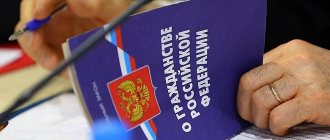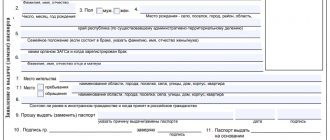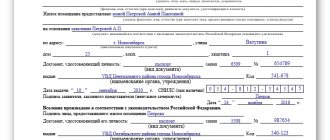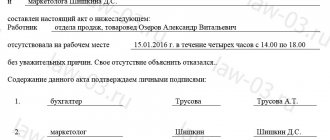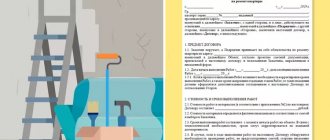The right to obtain Russian citizenship through a simplified procedure due to the status of a native speaker of the Russian language is provided for in Art. 14 of Federal Law No. 62 “On Citizenship of the Russian Federation” of May 31, 2002. Only legally capable adults who are fluent in Russian and live themselves or have relatives in the territory of the Russian Federation can be recognized as carriers.
The procedure for obtaining status is described in Article 33.1 of the same regulatory act, and involves two key stages - filing an official application with a request to be recognized as a native speaker of the Russian language and an interview with the commission for recognizing a foreign citizen or stateless person as such.
How to fill it out correctly?
The application, in the form of which a request is submitted to pass the commission in order to pass the exam and obtain a NRN certificate, contains the following positions and questions:
- First comes the request, which states the grounds for the procedure.. It is based on article number 33.1 of the Federal Law, dedicated to the citizenship of the Russian Federation:
- everyday, competent fluent use of the Russian language;
the presence of a relative who lived or lives in Russia on a permanent basis, who could also live in the USSR or the Republic of Ingushetia (Russian Empire), we are talking about relatives of a direct ascending line;
- residence within the territory of the Russian Federation and predecessor states within the modern borders of the Russian Federation by the applicant on a permanent basis (by permanent residence permit or registration, on other grounds) in the past;
- several of the above reasons.
- FULL NAME. – are indicated in full , it is also necessary to enter the previous full name.
(if any), reasons for changes, dates when changes were made. Example: Sviridova Galina Alekseevna (according to her birth certificate - Apraksina Maria Alekseevna, upon marriage on 06/10/2001 - Sviridova Maria Alekseevna, for personal reasons from 05/06/2008 - Sviridova Galina Alekseevna). - Date of birth, then the place where the applicant was born (according to the birth document).
Example: date of birth – 08/23/1980, USSR, RSFSR (according to the birth certificate – Moscow, RSFSR). - Provide information on citizenship status:
- country of citizenship, if any;
status of a stateless person, if the applicant is one.
- Provide a brief summary of the applicant's biography:
- reliable data on place of birth;
information on places of residence, their change, change of citizenship and country;
- information on places of education;
- a brief summary of places of work and terms of employment;
- any personal data that the applicant considers necessary to include to increase his chances of obtaining NRN status - for example, information on olympiads won in the Russian language, scientific works, works and articles published in Russian, etc.
- Lead information on documents that can certify the fact of studying the Russian language:
- certificates and documents on completion of individual courses or practical training are suitable;
A diploma of higher education in the Russian Federation or a school certificate can be accepted as a corresponding document.
- Information about the applicant’s relatives who lived (permanently) within the borders of the Russian Federation, or the Republic of Ingushetia and the USSR, as well as about the applicant’s independent residence in Russia in previous periods:
- indicate the period;
- address;
- person
- Direct ascending line of kinship – mention your relatives:
- father;
mother;
- grandfather;
- grandmother;
- great-grandfathers, etc.;
- degree by kinship;
- FULL NAME.;
- date of birth;
- what country they have citizenship of;
- where the living live;
- year of death for the deceased.
- Data on the document that allows you to reside in the Russian Federation:
- type;
number;
- date of;
- other information relevant to the document.
- Indicate the address where the applicant actually lives at the time of submitting the application, and contact information.
Example: Moscow, National Hotel, number 6, mob. phone: 89032010312. - Information on the documentation that is provided along with the application , the list depends on the status of the applicant.
Example: knowledge of the Russian language and its everyday use in cultural, everyday and other aspects, as well as residence on the territory of the USSR in the period from 1976 to 1989.
Example: German citizenship.
Example: born in Moscow, lived until 1989 with her parents in Moscow at Tverskaya Street. 17, moved with her parents to France, where she lived until 2006, got married in 2006, moved with her husband to Germany, since 2006 I have lived in Berlin, and in 2012 received German citizenship.
From 1987 to 1989 she studied at gymnasium number 6 (with a literary bias) in Moscow, from 1989 to 1998 at school and college in Paris, from 1999 to 2005 she studied at the Sorbonne University, majoring in linguist, her thesis was devoted to developmental differences Russian language in the USSR and among immigrants in Paris.
Since 2006, I have been working in Berlin, in the office of the Mercedes-Benz Corporation as a simultaneous interpreter.
Example: certificate number 00012345323 dated September 10, 1995 for Moscow State University courses in Russian language and literature.
Example (to be filled in the table):
| Relation degree | Surname, Name, Surname | Day month Year and place of birth | Citizenship | Country of residence and address |
| father | Apraksin Alexey Grigorievich | Born October 10, 1959 St. Petersburg RSFSR | France | France Paris, st. Veniz, 11, apt. 1 |
| grandfather | Apraksin Grigory Andreevich | Born 01/05/1929 St. Petersburg RSFSR | USSR | Died 2001 |
Example: migration card No. 30 13 8116579, entry date 03/10/2017, entry point Sheremetyevo.
Next, you must sign a consent and awareness of the responsibility for providing data that is known to be false. Agree to the processing and storage of data according to an automated procedure. Indicate the date of completion. Signatures are placed in the presence of the GUVM employee accepting the application.
Not eligible for the NFP citizenship program? This is not a reason to give up the desire to become a full-fledged resident of Russia!
Use other ways to obtain Russian citizenship:
- by parents;
- by official marriage;
- under the program of resettlement of compatriots;
- according to the general scheme;
- in a simplified manner.
Requirements
The form must be filled out in clear, legible handwriting; corrections and blots are not allowed. If you still make a mistake, you should take a new form from the employees of the department of the Main Department of Migration Affairs of the Ministry of Internal Affairs of your choice (they are free) and fill it out again.
In addition to the personal signature certifying the application, the applicant also needs to leave it next to the lines warning of liability for providing false information: any information you provide will be verified by government agencies.
NRY status opens up broad prospects for living and working in Russia for foreigners and stateless persons. A correctly completed application for recognition as a native speaker of the Russian language will help you obtain it without unnecessary hassle.
Find out more details on how to fill out an application for an NRN, and also take a look at the wording and samples in this article: https://101urist.com/migratsiya-i-grazhdanstvo/poddanstvo/poryadok-polucheniya/sposoby/v-uproshhennom-poryadke /nositeli-russkogo-yazyka/kak-zapolnit-zayavlenie-o-priznanii.html
Features of filling out the clause about relatives
If there are relatives who allow you to apply for the status of an RN, it is important to note them in the relationship table, as well as separately indicate them in the paragraph dedicated to this category.
In the sixth paragraph of the statement about relatives who lived in Russia, the USSR or the Republic of Ingushetia, you must write:
- relation degree;
- FULL NAME. – as in the case of your own, it is important to note data at birth and changes throughout life (without indicating the reasons or indicating at will);
- years of constant registration, registration, life within the borders of the Russian Federation;
- address (exact for the USSR and the Russian Federation, approximate for the Republic of Ingushetia), where the relative lived - from the region to the apartment/house, etc.
If you have relatives that give you grounds to apply for an RN, you must add the following to the set of documents submitted with your application:
- Documents that confirm family ties - certificates of marriage, birth, death, etc.
- Documents that will allow you to establish the real fact of residence of a relative at the specified coordinates at the specified time - military ID and registration, a copy of the passport with registration, birth or marriage certificates, extracts from the house register, etc.
- Archival documents as additional evidence base.
What documents are needed to obtain citizenship under the NRN?
To submit an application, the following documents are required:
- a document according to which a citizen is recognized as a PRN;
- original and notarized translation of the passport;
- completed application (2 copies);
- 3 photographs measuring 30 x 40 mm;
- resident card;
- confirmation of payment of the duty (in 2021 its amount is 3,500 rubles).
Please note: all provided copies of documents must be notarized, otherwise they will be considered invalid.
Assistance in obtaining RN status after a residence permit
In the process of preparing for the upcoming RN exam after a residence permit, foreigners experience difficulties. Difficulties arise in the process of applying and registering for the commission. You will be able to take part in it only after providing a complete package of necessary documents, the form of which meets the requirements. Taking into account all the nuances is extremely problematic. Therefore, contact a lawyer.
We employ competent specialists on migration issues. They will tell you how to assign the status of an NRN after a residence permit, and inform you about the list of necessary documents, taking into account the personal characteristics of the situation. We will then provide assistance in scheduling an interview, filling out an application, and completing other required steps. As a result, you will save time, reduce the risk of errors and will be able to increase the likelihood of obtaining the AE status after a residence permit the first time.
Legal aspects
The main law, which indicates the need to pass an exam and confirm proficiency in the Russian language, is the Federal Law “On Citizenship of the Russian Federation”
In most cases, to recognize the fact of proficiency in the Russian language, you will need to pass a test - an exam.
Without this, it is impossible to acquire Russian citizenship in a simplified manner.
The main law, which indicates the need to pass an exam and confirm proficiency in the Russian language, is the Federal Law “On Citizenship of the Russian Federation”.
Plus, a number of provisions justifying the legal status of foreigners on the territory of Russia are substantiated in the Federal Law “On the Legal Status of Foreign Citizens in the Russian Federation.”
Both of these legislative acts determine the differences in rights between foreigners and our fellow citizens, as well as the possibility of obtaining Russian citizenship.
Terms of recognition as a native speaker of the Russian language
The entire period of time required for recognition of an AE is divided into several stages:
- After submitting a complete package of certificates to the Main Directorate for Migration, any applicant must be given a response regarding the appointment or refusal of an interview in the next 2 days.
- The interview itself must take place no later than 5 days after receiving the application.
- When, based on the results of the commission, the request to recognize the applicant as an RN is satisfied, a decision confirming this must be made no later than 5 days from the date of the meeting. During the same time, they are required to submit a certificate of recognition.
